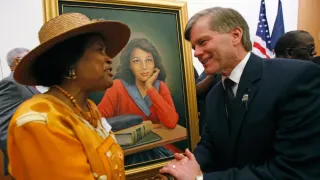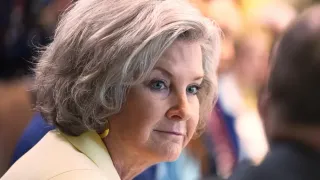February 5, 2018
Sequence Six: The Archivist
Kilian Melloy READ TIME: 21 MIN.
The earth trembled, rough plaster fell from the walls and ceiling, gouts of earth showered down, and still Domo refused to budge.
"They're almost on top of us!" Rado was shouting. Panic boosted his voice; domo could hear him clearly over the noise of detonations and the din of the colony's inhabitants gathering up necessities and preparing for a hasty exodus. "We have to go!"
"No." Domo didn't try to make himself audible over the racket, but Rado seemed to hear him fine.
"You're an idiot!" Rado cried, frustration and fear flushing his face to a high ruddy hue. His pale blond hair stuck up all over, looking like quills on a porcupine. His blue eyes, usually hard and crystalline, now had a watery look. Domo wondered if he were on the verge of tears - if so, was it because of his terror at the approach of the Prathists? Or was he worried for Domo's safety? The two had been boyhood friends, and their shared memories -- of elementary school, and food, and television shows, and all the wonderful things that had once been freely and publicly available in Philadelphia - had served to bond them during their first few years in the colony.
As adults, however, they'd had little to do with each other. Rado was a soldier, and Domo was a water worker - though in the last few months he had successfully pleaded his case to the council to be allowed to devote most of his time to the archive he had assembled and now did his best to maintain.
More detonations brought down more plaster.
Domo knew the sprawling warren of subterranean passages and rooms that made up the colony's living space and storage annexes. He knew where the water flowed, pooled, and drained; he also knew which walls were secure, which areas were well constructed, and which were susceptible to collapse. He'd situated his archive in an inconvenient corner of the colony, not because he wished for isolation but because this was one of the more durable rooms, having once been part of the basement of a municipal building. He'd spend months dragging crates and boxes into this room, and more than once he'd had close calls while scavenging away from the bulk of expedition parties to the city's various precincts. The places he needed to go to gather the materials he required were often close by the wrecked old supermarkets the others focused their attention on; sometimes a warehouse would be located within jogging distance of a likely source of archival material and the equipment he needed to make it useful. There was one facility in particular that served everyone's needs, an old Amazon shipping depot, but the expeditions rarely ventured that far away from the colony. When they did, it was a big deal - a well planned, heavily staffed excursion that more likely than not would involve fighting, maybe even some exchanges of weapons fire.
The colony was fairly prosperous, and could supply the fighters needed to safeguard the scavengers. With the winter cold reaching the lower twenties, Domo had hoped that there might be another venture to the Amazon depot soon; most other colonies tended to keep their people underground in such weather, to protect them from sickness. There was even snow on the ground and ice on the nearby ponds -- a rarity now that summers were cripplingly hot and rain fell far more often than snow. Domo vaguely remembered his parents mentioning something about global warming, and he wondered whether this was what they had meant... but that had been in his childhood, before The Cull, eighteen years ago. Domo supposed any warming that had happened before The Cull would have run its course by now... well, but maybe not.
Rado was shouting at him again.
"God damn it, Domo! What's the matter with you? The Prathists are coming. You know? Bad guys? They're gonna kill us!"
"I'm not leaving the archive," Domo said.
"Dominic, please!" Rado screamed, using Domo's old name - the boyhood name he'd outgrown long ago, the name that had been truncated and ground down, as had everyone's names, along with everyone's hopes and ambitions.
That was exactly why Domo had assembled this archive - first on his own, in whatever scraps of spare time he could finagle, and then, after hard-fought victories, with the resources that came with the support and backing of the colony's council. Someone had to reassemble the world that had been lost. Someone had to find a way to reach out and grasp the dreams that had slipped through humanity's fingers.
Domo had sealed his argument to the colony council not just with impassioned words, but with the persuasive power of cinema itself. He's repaired an antique optical player, and then chosen carefully from the half-dozen titles he had gathered on the compatible format. He had wavered between "A River Runs Through It" - a film that showed glorious open spaces and the dynamics of a family living in the early 20th century - and a musical of uncertain title, the first fifteen minutes of the film having been lost to disc damage.
In the end, though, he'd settled on a comedy - some nameless and formulaic entertainment that was so bland and unremarkable he'd forgotten what it was called, forgotten everything about the story except that it dealt with a large family of bickering adult siblings, their idiosyncratic (and separated) elderly parents, and the spouses and children that complicated their lives. It was such dross that Domo knew the council would find no ideological objections; the drama was driven by trivial things, and in the end the paterfamilias and his estranged wife were reunited. More to the point, however, the film was unconsciously ostentatious of the material privilege the family enjoyed: A large house on a sprawling estate, sunshine, abundant food, motorized vehicles, brightly colored clothing, unbelievably new and clean, without holes or rips or grimy stains.
This was the dream he knew the members of the council shared, as did many in the colony; a half-remembered time of abundance everyone missed. The council loved it, as Domo knew they would. Most of them were in tears as the film ended, and it wasn't because of the treacly denouement.
That was the raw power of cinematic stories, and Domo's life had been driven by memories of movies as fundamentally as the lives of others were marked by early recollections of the things the movie he'd shown the council had displayed: Plenitude. A miraculous freedom from privation. A sense of safety and security that seemed, in these days of the ongoing Cull, like the very definition of a paradise.
And now the Prathists were at their door, and Rado was telling him that he had to leave? Forsake his archive, betray a vocation and a need that felt like nothing less than a sacred calling?
"I'm not," Domo said, calmly. "I won't."
Rado's face was a mask of aggravation and terror. "Listen, it's not worth it - all this, it's a bunch of useless old shit!"
All of this? The antiquated video tapes, the spools of celluloid? The hard drives and lumentics? The lone cerebrex with its commercially produced narrative memory grains? The hardware, the software, the free-for-all of mixed media Domo had curated and worked tirelessly to preserve and rehabilitate?
His life's work was not useless old shit. And Domo would ensure the safety of the work he'd accomplished, or die trying.
Rado stared at Domo.
Domo stared back, inscrutably, at Rado.
"Look, I'm sorry, but we can't take this stuff with us!" Rado was sounding horse, maybe because he was pleading.
The detonations stopped and the rumbles subsided. Domo set about sweeping the fallen dirt off his work table, where he had set out new acquisitions for assessment. "I'm not asking to take anything away from here," Domo said. "And I'm not going, either. I'm staying here with my archive."
"Are you kidding me right now?" Rado screamed. Quiet had fallen over the room; the few people living and working in this area had cleared out. Domo supposed the lack of earth-shaking noise didn't actually mean the attack had ended. The first thing Rado had told Domo when he'd come bursting in a few minutes ago was that the Prathists were working to breach the security of the North gate. They had either come to a point where they need to pause for a while - to rest, to resupply - or else they had achieved that objective and were now working their way into the colony's depths.
No doubt the invaders were fighting the active guard, the soldiers who were tasked with defending the colony's inner precincts while its people fled to the South and West gates and escaped. The active guard wouldn't run; they would stand and fight and earn meaningful deaths. They had no better prospects; The Cull had caught up with them. The affliction was always fatal, and it took different forms for different people, but the nurses knew it when they saw it. The nurses also had a way of figuring out who was going to be affected - though they never knew when. The Cull killed the members of different bloodlines according to how many generations their family had produced. Someone once told Domo that every human bloodline had a built-in expiry, and The Cull would destroy the members of the forty-second-thousandth generation. For most of human history all people had bred young, but in the last century that had changed; wealthier people had started to delay reproduction until later in life. Over the course of a few generations a gap of several decades had opened between the early victims of The Cull and those whose genetic self-destruction had yet to come. Usually The Cull struck in mid-life, but not always, and there were certain conditions that could activate it - something the nurses called epi-genetics.
Domo didn't understand much of this, except to liken it to his own vocation. From old books he'd attempted to replicate, and from his own experiments in media preservation, he'd come to understand that a vid could be copied many times, but depending on the format its quality would degenerate with each successive reproduction - either quickly, as with celluloid and magnetic tape, or more slowly and subtly, as with optical discs, digital hard copies, and gel drives.
Worse than the degeneration of copies made from copies was the way time destroyed original source materials - through damp, through physical wear and trauma, even - as Rado discovered while reading old books on the subject - through use.
Rado broke into Domo's abstractions. "If you don't move your ass, I'm gonna leave you here," he warned.
Domo looked up form his work table. He'd become so engrossed he'd almost forgotten his old friend was still there. Domo felt a flicker of worry then, concerned at the way time was running out and the Prathists getting closer. He wasn't leaving but he didn't want Rado getting killed on his account.
Domo made a gesture intended to signal his willingness to see Rado go. Maybe the Prathists really did intend to kill and rape and cannibalize the colony's people, just as the council had repeatedly said they would if they ever invaded. But even if that were all true, where would the colony's residents go? It wasn't likely any of the other colonies would take them in. They all existed in a state of mutual antagonism. Their community having been one of the richest - if not the single richest - of all the colonies in the city, Domo doubted the other strongholds would show much pity toward any refugees. The people of the colony had fought hard in the past to secure their living space; even now they fought hard all the time, against every other colony, to claim the lion's share of the ruined city's ever-dwindling resources.
In that, they were hardly unique. Every colony fought hard and constantly against every other; the few alliances that had been forged between different communities over the years had been short-lived. They invariably ended with betrayal, or at least a fear of betrayal, even when they achieved some greater purpose, such as the defeat of the savage Christics years before. As a consequence, no one trusted anyone else, and that mutual suspicion had allowed the large colony Domo had always called home to defend its holdings against the myriad of smaller communities.
But the Prathists had proved to be a different matter. Like the Christics, they were a vicious lot; unlike the Christics, they were a clever lot, as well. They didn't just swarm and scuffle, the way the other colonies did. They engineered traps; they worked out tactical methods of luring and then decimating scavenger parties. And now they had built some sort of battering ram, a war engine that could clobber down the heavily reinforced North gate through sheer relentless pounding. They hardly had any ammunition for their firearms - no one did, any more - but they had other kinds of weapons. Bows and arrows. Some sort of burning fluid that they spouted in terrifying jets. Slings, from which they launched rocks and fragments of brick.
Other colonies fought in a wild, disorganized way, using anything that came to hand; the Prathists, uniquely disciplined, spent a lot of time perfecting their weapons and their battle skills. They claimed more casualties with less effort. They knew how to fight with lethal efficiency. And while it was still true that no one, including the Prathists, was open to a large alliance, the Prathists had gained a reputation for taking in the criminals and rejects, the dross that every colony turned out because they consumed more resources than they were worth. That was a reason the council had not taken decisive action against the Prathists years before, when they were weak and just starting to use their effective new strategies. The council believed that by taking in the rejects, the Prathists had undone themselves: Surely their colony would fall into chaos, they would be destroyed from within.
But that hadn't happened. The rejects that were supposedly little better than animals turned out to be fiercely loyal to their rescuers. Now Prathists themselves, those exiles fro many communities were possessed of demonic energy and a determination to advance their adoptive colony and its cause.
Even if he'd been willing to leave his archive, Domo reasoned that his chances were better if he stayed put. The Prathists had a liking for rejects? Well, he'd just explain to the Prathists that he, too, was a reject among his people; that he'd been shunned and persecuted; that he had been on the verge of exile when the Prathists showed up to overrun the colony. Yes, the colony council had been moved by what Domo had shown them, but lately there had been rumbljngs of discontent from the community at large. People had started accosting Domo, accusing him of shiftlessness, of stealing resources that he did little to replenish. And why? Because of old movies? The colony council somehow didn't see the wisdom in Domo's pleas to allow him to organize community exhibitions of the material he'd rescued and preserved. They wanted him to keep working on his projects - they spoke with admiring tones of how he was saving culture - but the idea of culture being something that could sustain hope and communal vitality appeared to be beyond their grasp.
Domo had known that things could not stand as they were for much longer. In a very real way, he found the invasion to be a kind of gift from providence. No, actually, it was more than that; he'd felt this day coming, felt it deeply and intuitively, had in fact counted on it. The Prathists and their terrors came as a relief, a reprieve, and maybe even a precious new beginning, something to build on even though it meant the destruction of the society he'd always known and the almost certain deaths of everyone with whom he had ever associated.
Domo had no doubts that others from his colony would have called it a betrayal. They would have condemned him for what, to them, would seem nothing more than cowardice; but it wasn't in the interests of his own survival that Domo had made his plan, desperate as it was. It was - as everything in his life had been - for the sake of his archive.
Rado was still staring at him, with an increasingly agonized look. He was moments away from abandoning the colony, and Domo along with it.
Domo tried to explain himself to old friend. He held up one of his most exciting new acquisitions. "I can't leave this. Do you know what it is? It's a gel drive of 'It Happened One Night,' and it's fully intact. I waited years to find this. And..." Domo snatched up another new acquisition. It was a optical disc, round and flat and shiny. "Pretty, isn't it? It's a high-acuity digilume of 'It's a Wonderful Life.' An amazing rarity. One of a kind. I don't even know how I'll devise a playback system for it, but I'll figure it out. Sooner or later I always do."
"You're fucking crazy," Rado told him, his horse voice now a rasp.
"You called all this material 'old shit?' Well, it's not. It's more than that. It's who we are, who we were, who we could be again. It's our culture, our heritage - it's the physical remnant of all our perished ancestors," Domo told him. "These are the stories they left for us, these are their unguarded dreams. On gel drives and data lumes and string-crystals, on every sort of recording technology, they preserved these dreams for us... or, not for us. For their own pleasure, but certainly they had the wish to share these creations with us. Only, the world collapsed..."
Rado shook his head, sweat glistening on his face, his expression one of sorrow and desperation. "These are just dreams, Dominic. Dreams come and go. We wake - they vanish. We have to move on."
"Rado..." Domo tried to remember Rado's childhood name, the one he'd used so many long, toiling years ago. Raymond? Raymundo? Something like that, but he couldn't quite bring it to mind. He'd forgotten much of his own past, consumed as he was with making a home for this communal past -- creating his archive and, in so doing, taking strides toward a future of light and safety, freedom from fear and hunger, a promised land of moving visual poetry.
Rado stared at him. There were shouts, cries in the distance.
"Go," said Domo, and Rado whirled and took to his heels. "Go on, go on. Rush into the blind, blank future, a world without memory or hope. If I die today, I die among beauty, the beauty I've worked all my life to reclaim." Domo beamed down at a digilume he'd been polishing and trying to restore to playback condition. " 'Lawrence of Arabia,' " he breathed. "Peter O'Toole. And..." His gaze shifted tenderly to another digilume. " 'Breakfast at Tiffany's.' Ah, la gamine." Another word he'd learned from a rare old book.
The shouts were louder now, and the sound of pounding, approaching feet became audible - still distant, but growing closer. These, thought Domo, must be his new patrons.
Domo picked up a gel drive and flicked dirt off its dull black housing. He could barely make out the tiny letters that spelled the title: "The Big Lebowski." It sounded literary. He wondered whether it had been adapted from a book. If only he'd had time to collect books from all those wrecked apartment complexes... as it was, he'd barely had enough resources to rebuild a couple of readers and use them to access the memory drives he'd picked up over the years. Most of them only had magazines or dynamic animation videos on their drives - he'd found no more than three or four dozen novels, memoirs, textbooks, and historical accounts. Of what he'd found, he had focused on the content having to do with cinema.
Domo swept the dirt off everything - tables, workbenches, electronic equipment, cabinets, and his prized 70 mm projector, a real antique that he would probably never get to run. Even if he did, he had no celluloid to load onto it. But with time, he thought, he was likely to stumble onto a few cans of real, live film some day... when he did, he'd be ready... and then, and then! He'd be able to show a movie, maybe several movies, to the others in the colony!
Domo stopped, stock still, as he remembered that all his old friends and colleagues were now gone. If he showed the movies to anyone, it would be to new people. Prathists. He hoped the Prathists weren't Philistines.
He was about to find out: Voices echoed in the corridor. A moment later a small group of men entered the room. They strode in and raised their weapons at the sight of him. They were wielding what looked like crude machetes, fashioned from scrap metal and wood, twine and plastic. But they also looked sharp and deadly.
Domo raised his hands. "You have nothing to fear from me, brothers," he said.
One of the men snarled at him and stepped closer. The others hung back. Was this the leader?
"I rejoice at your coming," Domo said. "I was about to be exiled. I would have come to you if you had not arrived here."
"Are you a criminal? Do you waste food? Do you waste power?" the snarling man asked.
"Not at all. I am a very skilled scavenger and tinkerer. But the people who lived here before you didn't see the value of my work."
The snarling man looked around the room at the vintage equipment, the stacked crates, the scatterings of digilumes and gel drives. Behind him another man - taller, calmer - stepped out of the corridor and lingered near the door.
"What is all this shit?" the snarling man asked.
"All this?" Domo made a small, encompassing motion with his still-upraised arms. "This is... a weapon."
"What kind of weapon? Why didn't they take it with them?"
"It's in pieces," someone said.
The men laughed.
"Is that true?" the snarling man asked. "Does all this junk fit together to make a weapon?"
"It's more complicated than that," Domo told him.
"Ah, bullshit," one of the men said.
"Bullshit," the snarling man repeated, giving Domo a hard, hateful look.
"I promise you it's not," Domo said, and then fixed his gaze on the tall man who still hung back by the door. "But shouldn't the great one decide?"
The men murmured and even the snarling man turned to glance back at the tall man, who now stepped forward. He cross the room with a smile that could have meant anything: Benevolence, happiness, amusement... "Great one?" he snorted.
"You are the leader of the Prathists?"
"That's not what we call ourselves," the tall man said, touching the snarling man on the arm and waving him to the back of the room. The snarling man gestured to two others and they left the room as a group - to continue their appraisal of the colony, Domo supposed.
"I hope you will take me in and teach me your name for yourselves," Domo said.
"That depends on the worth of this weapon, and on your own worth."
Domo looked the tall man right in the eye. "Please hear what I am saying to you. This weapon isn't a gun or a knife or a grenade. But it is powerful. May I speak about it?"
"For as long as I'm interested in hearing what you have to say," the tall man said.
"You can provide your people with clothing and food and water," Domo said. "You can provide them with machetes and ammo. Even medicine."
The tall man smiled with pride. "Yes, even medicine," he said boastfully.
Domo smiled back. "And now you can give them something even better. You can give them memory. You can give them dreams. You can give them purpose - a purpose beyond living another day. Purpose is the greatest of all weapons. Stronger than steel. More exciting than guns. And not like ammo... you don't have to run out. This room is an archive of stories, and of convictions. Do you remember the Christics?"
The tall man's smile faded. With a black-eyed frown, he spat.
"Yes," Domo said, "yes, and the city was well rid of them... but they had a weapon much like this one. You remember what a small group they were, but how remorseless, how wild, how unrestrained? Their passions made them the most dangerous of all the colonies, and wiping them out was one of the few pressing concerns that caused an alliance to form between many colonies. That passion was a weapon."
"It was a lie!" the tall man barked. "A story so ridiculous no child would believe it."
"But they believed," Domo said, "and that belief gave them unstoppable energy. They starved, they bled, and still they were ferocious. This weapon - contained in this room - is juts as powerful, and it offers you much the same complete control. You can give your people faith in something that really does exist... or can exist, if we work toward it. A future. A future illuminated with..." Domo slowly moved an arm, a hand, a pointing finger, pointing to a collection of gel drives. "Illuminated with dreams."
"Dreams," the tall man said. "I don't see how they can help us."
"The only way to see," Domo made so bold as to tell him, "is to see..." He gestured at a lumpy mound on a tabletop at the side of the room. "Will you allow me to show you?"
The tall man nodded. "Why not? But if you're wasting my time, I'll kill you."
"You are the leader. My life, like every life in this colony, is yours," Domo said.
The tall man frowned at his obsequiousness.
But Domo didn't notice. He was rolling toiling over the lumpy mound, pulling back cloth to reveal a 16-millimeter projector. Domo tried to see the projector as it would appear to the tall man, tried to put himself into the tall man's frame of mind in order to explain more effectively. The tall man wouldn't listen to what he couldn't comprehend. Domo had to make what he said, and what he showed, matter to the tall man.
To the tall man, the squat little machine beneath the protective drop cloth would be an oddity. It might even resemble a weapon - something exotic and mysterious, something bristling with danger and mystique. To the tall man's eyes the projector would not be intuitively obvious in function, and strange in form: A machine outfitted with spindly parts that stuck up into the air - spindly parts to which were attached to a pair of round, canister-looking pieces. The projector shifted in Domo's perception. He concentrated, willing it to seem other than its familiar shape, a shape charged with stored meaning and memory, a shape that come with previously-forged associations. One of the round parts seemed full of something. The other round part was empty. The two seemed to complement each other in some obscure way. A thread of something flat and shiny, something like packing tape, strung from the full canister and fed through the machine to the empty canister.
"What is this?" the tall man asked, and Domo, his focus interrupted, struggled to hold on to the frame of reference he was fabricating for himself.
"A very old machine," Domo replied, making sure everything was in order. As he'd done with the colony council, he'd spent countless hours combing through his archive, looking for just the right example of the work he wished - he needed - to share and advocate for. The film he'd chosen wasn't in pristine shape... far from it... but Domo was betting it was exactly the sort of thing that would speak to someone like the Prathists.
Or, more to the point, someone like the leader of the Prathists. Someone strong, someone practical - and yet, someone possessed of vision. Now that he stood before Domo, the tall man struck him as just the sort of leader he's imagined the Prathists, in their combination of ingenuity and ruthlessness, must have. Now if only his carefully repaired equipment would do its part... and the colony generator continue to operate...
The projector had to work, Domo mused in a state of near-detachment, had to capture the tall man's attention right away, or he'd dismiss projector and Domo alike. The result would be bad all around: Blood, death, smashed debris. Domo pushed that image away, summoning an alternative that was more to his liking: The tall man, wonderstruck, understanding with visceral certainty the newfound power at his command. People loved cinema... some people with a passion. Please, Domo thought to the tall man, please be one of those people. "This is one of the earliest ways to create dreams and then play them back," he said.
The tall man watched as Domo flicked a switch. Light suddenly blossomed from the machine and the canisters started turning with a sharp clicking sound. The tall man stepped back.
"It's okay," Domo assured him. "This is how the machine operates. Images are imprinted on the tape. The images pass in front of a lamp, and create the illusion of a moving picture."
"You mean a vid?" the tall man asked.
"Yes, but not digital. It's another process. It's very primitive. But..." Domo smiled broadly and pointed at the far wall. "See?"
In the room's dim lighting it wasn't hard to see the projected image that had appeared. The images were grainy, blurry, black and white; figures appeared, their movements a little too fast, a little jerky. A man with piercing eyes and a small square moustache gripped a podium and shouted silently. The image changed to show the view over his shoulder - a view of thousands of people standing in a great open space.
"What a crowd," the tall man said. He'd never seen so many people.
Then the image changed again, showing groups of men formed into tight, precise squares. They marched in perfect synchrony, their long thick overcoats and black boots making them look massive and invulnerable. On their heads they wore helmets, and in their arms they carried firearms. One man in each formation carried a flag - not an American flag, as many colonies displayed, but a gray flag with a white circle in the center, and within the circle a black shape like a cross - but a cross with each leg broken. The symbol looked like an abstract square or a nightmare asterisk, something that pointed to frightening footnotes of history. Or a musical note perhaps - a note in a symphony of fear...
The view changed again, showing a majestic structure - upswept and monumental, architecture meant to impress and impose, and long gray banners trailed down from the great structure's flanks, white dots prominent, broken cross poised in each, vital and strong, like a weapon in flight...
The image flickered and disappeared. The clicking stopped.
"These are very old dreams, but their power has not diminished," Domo said in to the silence. "These very dreams once lifted a battered and downtrodden nation to greatness, unifying its people and creating a common will where before there had been only factions and fighting. We can be great like that nation was... great because of the dreams we share. Dreams you can give us. Through this." Domo rested his hand on the squat machine. "And those." He nodded toward his work table with its assortment of cinematic media.
The tall man stepped to the work table and looked at the gel drives and digi-lumens. He picked up a gel drive and turned it over thoughtfully in his hand. Domo could see excitement in his posture and his movements - a new energy coiled in him, an excitement at the martial images he'd just taken in. Domo rejoiced silently: He had won.
The tall man looked back to Domo. "And who are you?" he asked.
Domo's smile grew brighter. "I," he said, "am the archivist."






